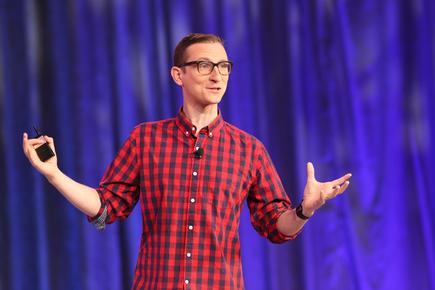
There are new opportunities to use data to learn about ourselves, our community and the world we are living in... This is an incredible time for us as a species.
We are living in “truly revolutionary times”, says Jake Porway, founder and executive director of DataKind.
For instance there are now more mobile phones on the planet than people, he states.
“Almost every activity that we perform online is digitised … we are surrounding our globe with sensors from earth, sea and sky to track everything we are doing,” says Porway, who spoke at the inaugural SAS Analytics Experience forum in Las Vegas.
“That combination of ubiquitous data with incredible breakthroughs in algorithm and deep learning, means we are not just talking about a data revolution... we are talking about nothing less than ‘the new age of reason’.
“There are new opportunities to use data to learn about ourselves, our community and the world we are living in... This is an incredible time for us as a species.”
“In the past five to six years since this big data explosion happened, so far, we have gotten so good at using this data, using this advanced technology ... to sell people stuff,” says Porway, whose previous role prior to founding DataKind, was the data scientist in the New York Times R&D lab. He has a BS in computer science from Columbia University and has an MS and PhD in statistics from UCLA.
Thus, Poray puts forth a proposition to the audience of mainly data professionals from across the globe: “We must be able to use this data and technology for another aspect, for social impact.''

The combination of ubiquitous data with incredible breakthroughs in algorithm and deep learning, means we are not just talking about a data revolution... we are talking about nothing less than ‘the new age of reason’.
His quest on how to use data science for good, led him to a discussion with other data scientists and also attending a hackathon.
It was quite an experience, he says, of his first hackathon, as he worked with data scientists and developers to see what cool stuff they can come up with.
Among the people he worked with was a machine learning expert from Google and a scientist from NASA.
He says one team built a parking app and another team built an app for local deals.
“They are fine, but they are more of the same,” he says.
“Technologists aren’t the whole solution,” he says on the series of events that led him to found DataKind.
Today, the organisation works with data scientists across the globe and teaming them up with social organisations.
These organisations are awash with data, but have no data scientists to help them. It seems like an easy matching problem, he states.
He says data scientists volunteer to work on weekends, or help the social organisations with their projects.
At the same time, this will give social organisations a chance to maximise their impact. “In the process, we get to live in a better world.”
He cites one such example, Simpa Networks in India, which brings solar energy to people who live in remote areas and who are, “off the grid”.
One billion people do not have electricity, which impacts your work and education, he says.
Simpa Networks give people a solar PV (photovoltaic) system that can be paid off by topping up with their cell phone to buy solar power. In the process, users pay for the machine and when they have paid for it completely, they have a free solar-energy generator.
Scientists from different companies like IBM and MasterCard analysed the data of how people interact with their systems, and when they are actually able to repair them or not.
They were able to understand the behaviour of different types of consumers - people who paid off their unit, those who are still paying it off and those who were unable to pay over time.
The team was able to build a model that identified in real time, which people were unable to pay and to “give them nudges”, or behavioural interventions, like asking whether they needed to readjust their payments or needed financial help.
Now, they have a 33 per cent higher repayment rate, “which is huge for a small, social organisation”.
Porway concludes that data analytics is not just fun stuff to use in business.
“It is a way of seeing society and nature,” he says.
This means every member in the audience can bring their skills to organisations working on social problems, he states.
“We are using data to empower decisions on the kind of world we want to see.”

"Use #Data4Good, not just to ‘sell stuff". New opportunities to use #data by @jakeporway via @CIO_NZ https://t.co/pMQ0OPNDrV pic.twitter.com/tmByAt1PJC
— Sara Peralta (@SaraPeraltaH) October 5, 2016
Divina Paredes attended Analytics Experience 2016 as a guest of SAS.
Send news tips and comments to divina_paredes@idg.co.nz
Follow Divina Paredes on Twitter: @divinap
Follow CIO New Zealand on Twitter:@cio_nz
Sign up for CIO newsletters for regular updates on CIO news, views and events.
Join the CIO New Zealand group on LinkedIn. The group is open to CIOs, IT Directors, COOs, CTOs and senior IT managers.
